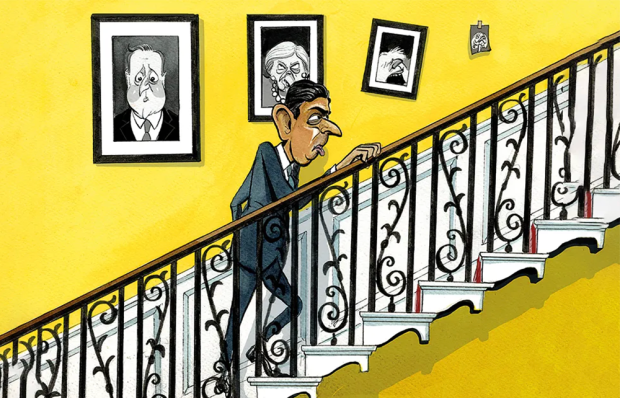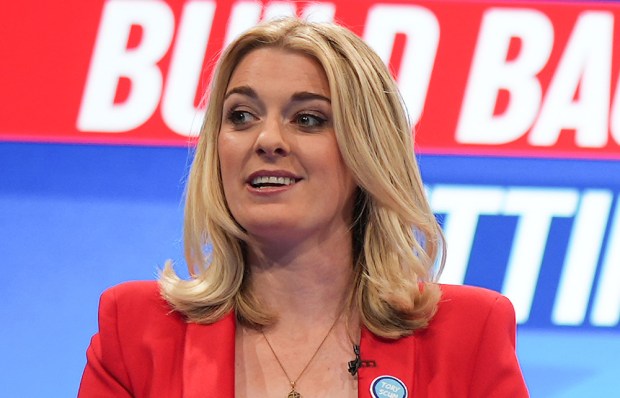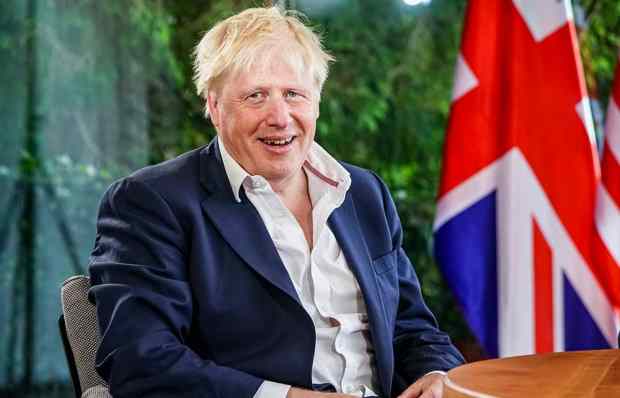When you ask a government minister why something hasn’t happened, you get a one-word answer: ‘Covid’. It has become the catch-all excuse for manifesto promises not materialising. But in the case ofsocial care, there is a particular truth to it. A meeting last week between the Prime Minister, the Chancellor and the Health Secretary nearly resulted in an agreed policy. A plan was expected this week. Then Sajid Javid tested positive for Covid, putting the three into isolation and the policy on hold.
Johnson feels he needs a solution to social care, having promised to solve the issue when he became PM two years ago and again in the Tory manifesto. One colleague, who has discussed the topic withhim multiple times, points out that if Johnson doesn’t come up with a solution, then what would he say at the next election? Another vague commitment simply wouldn’t cut it.
Social care was the undoing of Johnson’s predecessor. Until the ‘dementia tax’ debacle, Theresa May was heading for a comfortable majority. No. 10 has been analysing May’s failure as it works out its social-care plan. Two particular lessons have been drawn. The first is that however intellectually enticing the idea of not having a cap on care costs is, it doesn’t work politically. Second, don’t come up with a social-care policy just before an election.
There is a clear attraction for Johnson in sorting a problem that confounded his three predecessors. One Johnson confidant observes: ‘It’s like Brexit, it is all about getting it done.’ But the problemis how do you pay for it? If you are determined to have a cap, then you need to find a serious — and ongoing — source of funding. This clashes with another manifesto commitment: that the Tories would not raise income tax, national insurance or VAT.
The expectation in Whitehall is that national insurance, or a social-care levy that is to all extents the same, will rise to pay for it. In the battle of manifesto pledges, social care has trumped taxation. The size of the rise hasn’t yet been determined. But it will be at least one penny.
The appeal of this policy is that in the short term it frees up money for dealing with the NHS backlog. There are more than five million people on the waiting list; the Health Secretary has warned this could rise to 13 million. The departing chief executive of the NHS Simon Stevens says the backlog may take three years to clear.
It’s a sign of how far to the left the country has moved that a rise in national insurance to fund increased spending on health care is to be proposed by a Conservative government. When Gordon Brown did the same in 2002, it was seen as a huge political gamble. The Tories — including the newly elected MP for Henley, Boris Johnson — denounced the move in furious terms.
If the Tories do this, it will put Labour in a tricky position. How do they respond when a Tory government raises taxes to put more money into the NHS? They can argue that national insurance is moreregressive than income tax, but they’ll have to say whether they support or oppose the move. The Tories will also be able to claim that any Labour promise to spend more on the NHS or social care will lead to this tax going up.
But there is a political, as well as an economic, danger to the Tories in such an approach. Ahead of the announcement in the autumn, what remains of the low-tax Tory right will mobilise against the proposal. This bloc is not as formidable as it once was, yet it can still cause problems. Inevitably, more resources will start to be demanded to deal with the NHS backlog. Its next chief executive is unlikely to be as politically canny as Stevens, who was an expert at persuading the government that this was his last demand for more cash and then, when that was settled, asking for more, but it is not hard to work out how to play the game.
The irony of the policy is that the cap is not, in fact, the biggest problem with social care. The low regard in which the work is held — as evidenced by the poor pay and the emphasis on agency staff —is a more pressing problem. But the cap has taken on huge importance. The NHS might be the nearest thing the British have to a national religion, but for the property-owning classes, the belief you should be able to pass on that asset is a close second. The potency of the aspiration that wealth should cascade down generations means that any threat to it must be dealt with. Johnson’s calculation is that preventing any risk to this ranks higher than a commitment to low taxes in the hearts and minds of Tory voters.
The calculation is likely correct in southern seats with high property prices. The social-care cap will be the most middle-class part of the welfare state. It’s telling that national insurance, which pensioners do not pay, is the chosen vehicle. The tax exacerbates the issue of generational fairness. If this policy is pushed through and then the state pension increases significantly because of how the pandemic has led to earnings bouncing around (the triple lock requires the state pension to rise bywhichever is highest: 2.5 per cent, inflation or earnings) then Britain would start looking like a gerontocracy. Basic fairness requires the increase in the state pension be linked simply to inflation this year.
Longer term, the bigger worry for the Tories should be how they stop the rise of an ever-bigger state. After all, it is hard to believe that this will be the last tax rise to cover the costs of socialcare and the ballooning NHS bill.
Got something to add? Join the discussion and comment below.
Get 10 issues for just $10
Subscribe to The Spectator Australia today for the next 10 magazine issues, plus full online access, for just $10.
You might disagree with half of it, but you’ll enjoy reading all of it. Try your first month for free, then just $2 a week for the remainder of your first year.















Comments
Don't miss out
Join the conversation with other Spectator Australia readers. Subscribe to leave a comment.
SUBSCRIBEAlready a subscriber? Log in